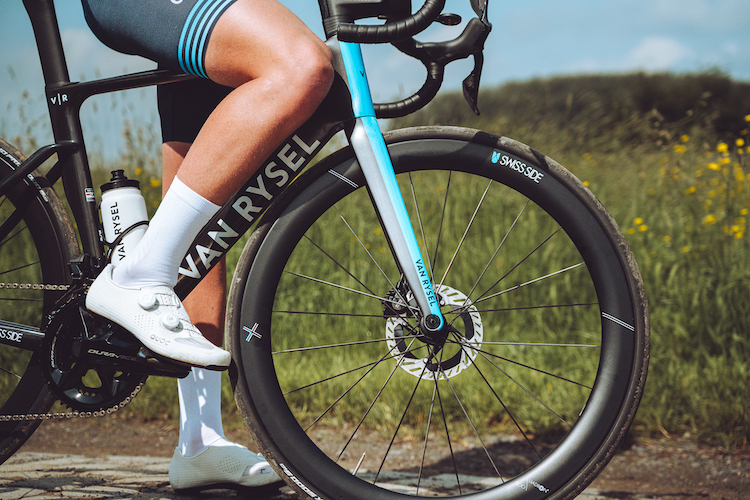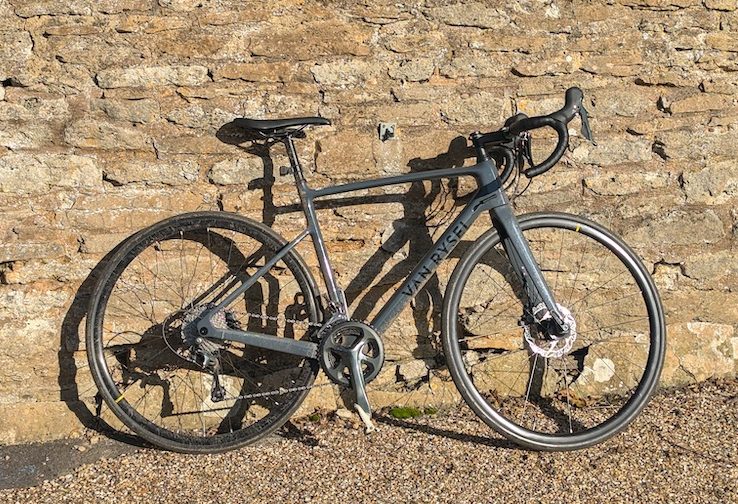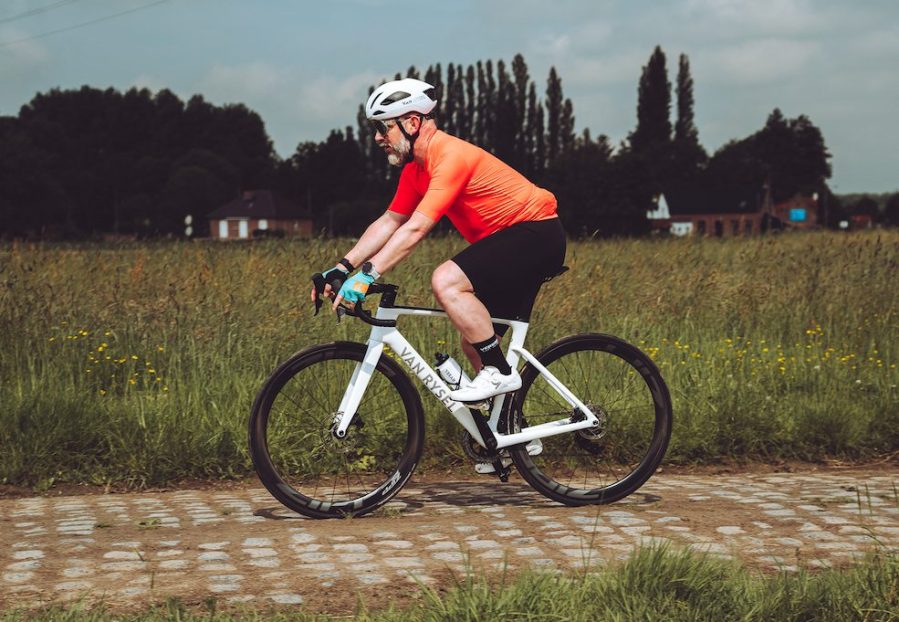With its RCR and NCR models, French brand Van Rysel offers an inexpensive way to buy a road bike worthy of the pro peloton.
Van Rysel means ‘from Lille’ and it’s in this famous French city that the new bike brand on the block manufactures a range of affordable high performance road bikes. Ridden in the Tour de France by the AG2R Decathlon team, its top-end team-edition machines are also available to buy off the peg – unsurprisingly from the team’s principal sponsor, ubiquitous outdoor brand Decathlon – at a fraction of the cost of similar high-end bikes. Its lower-end models are also ultra-competitive, in terms of cost and performance.
I was lucky enough to test-ride both the Van Rysel speed-focused RCR on the company’s local roads of Roubaix and the endurance-oriented NCR on my own rolling local roads of Somerset to see if they could match the performance of their big-name (and big price-tag) rivals.
Men’s Fitness verdict
Both the RCR and NCR offer outstanding value for money. The race-winning pedigree of the RCR and comfort and handling of the NCR should be much more expensive than this.- Light, stiff and agile framesets
- Excellent component choices
- Lots of options across the ranges
- Superb speed, comfort and handling
- No frameset-only option
Why you can trust Men’s Fitness
We spend hours testing every product or service we review, so you can be sure you’re buying the best. Our team of bike reviewers included experienced product testers, cycling journalists and fitness writers – as well as the core MF team – who know exactly what sets the best products apart from the rest. Find out more about how we test.
Any road cyclist with an interest in racing will probably know that France has professional cycling running through its veins. They’ll also probably know that Flanders is the beating heart of French cycling. On the border with Belgium, it’s been the battleground for many famous Tour de France stages as well as the historic Monuments – the one-day Classics races that are themselves the life blood of professional racing in northern Europe. It’s from this cycling Mecca that French brand Van Rysel hails, and it’s starting to make something of a stir…
If you were to buy a pro replica bike from the likes of Specialized, Trek or Scott, you’d expect to pay around £12,000 for the privilege. That would buy you a team-issue carbon frame, carbon wheelset and top-end Shimano or SRAM electronic groupset. Choose French company Van Rysel over one of those global bike behemoths and you’ll get an equally high-specced, high performing machine for three quarters of the price.

Van Rysel RCR
While the Van Rysel RCR Pro Replica Dura Ace Di2 AG2R Decathlon Team model may still be out of the price range of most mere mortals, the RCR Rival AXS Power Sensor model I had the pleasure of testing on the streets of Roubaix as well as the famous velodrome there is much more reasonable. OK, it may not seem that way at £4,000. But for a full-carbon chassis, electronic groupset and integrated power meter I’d be expecting to pay at least a grand more.
The frame is the RCR model, not the RCR Pro found on the team issue bike. All that means is a slightly different carbon layup, a weight increase of 40g and a minute loss of stiffness. But to all intents and purposes it’s the same frame.
You get the SRAM Rival eTap electronic groupset, Quarq power meter and Rival hydraulic disc brakes, with Deda carbon bars and Zipp 303 carbon wheels. That’s a lot of bike for your buck on paper. But how did it feel on its native roads around Roubaix?
Van Rysel RCR performance
Clipping in on the Roubaix velodrome I instantly felt connected to my ice-white machine. The riding position felt low-slung, aerodynamic and racy, but comfortable all the same. Seated power transfer through the SRAM cranks was instantaneous. Standing up and putting the power down, however, felt downright explosive.
What few hills we could find in the flatlands of northern France proved a breeze on the RCR. The entire bike in the medium I was riding weighs in at an incredible 8.1kg. It positively encourages you to get out of the saddle and dance on the pedals on the merest of inclines. And on descents it begs you to hug the top tube, get into an aero tuck and just fly. With a top-end groupset and those whirring Zipp wheels, there’s almost no resistance on fast-flowing, free-wheeling descents. The less you touch the brakes, the more chance you’ll be grinning from ear to ear at the bottom.
The carbon finishing kit helps keep the RCR in the ‘featherweight’ category and I found adds a nice touch of compliance. The SRAM disc brakes are extremely responsive too. I only needed to feather them; anything more tended to scrub off all my speed instantaneously. That responsiveness does does inspire a feeling of confidence and control though.
Should you buy the Van Rysel RCR?
After a couple of rides I got used to the instant stop-go nature of the RCR. Unlike other ultralight bikes I’ve ridden, it never felt at all twitchy. Not even when riding over the famous Roubaix cobbles that are so large that locals refer to them as ‘babies’ heads’.
If you’re after a machine for competitive riding, I can highly recommend the RCR. Unless you a 63kg pro rider you won’t notice the minor upgrades that the Pro machine offers (though you may notice the £4,000 price difference). If you just want a bike that will leave you grinning like a loon, then the RCR is your toy there too. It pretty much single-handedly helped me fall back in love with cycling.

Van Rysel NCR
If you have a more modest budget then the NCR is a great way to tap into the Van Rysel experience. While you can still get electronic shifting with the top-of-the-range NCR Rival AXS eTap model at £2,700, there are more modest but equally enjoyable options, including single and double chainring models.
I tested the NCR Tiagra version, which is available for an astonishing £1,400. You still get a carbon frame and forks, and hydraulic disc brakes, but the groupset is downgraded to the (still respectable) Shimano Tiagra line. That gives you a double ten-speed drivetrain instead of two by 12 on the higher models. The cockpit is aluminium instead of carbon, as are the wheels. There’s no power meter here either. But then that’s not surprising given this is the price of many average aluminum bikes.
Van Rysel NCR performance
It’s quite a different carbon frame to the RCR. It weighs in at 1,200g (still by no means portly) and has a different, more relaxed geometry. This is to give you a more comfortable, upright riding position. That’s because the NCR is Van Rysel’s endurance-focused machine, meant for long hours in the saddle. I took it on a number of 50km-plus rides to see how it handled the long haul.
Whereas the RCR encouraged me to push into turns, crank up the climbs and blast down descents, the NCR put me more in cruise mode. That’s not to say I didn’t have a blast on this bike – I definitely did. Instead I covered dozens of kilometers like they weren’t there. I’d often look at my speedo and notice I’d ridden 50km in sub-two hours without realising it.
Should you buy the Van Rysel NCR?
Wider tyres, that easy geometry and comfortable, confident handling make the NCR a pleasure to ride. It can still produce a good turn of pace if desired. But this bike is more about going far than going fast. If you like the idea of doing big point-to-point rides or sportives, then the NCR could well be the beast for you. I honestly can’t think of another sub-£1,500 bike that is so well specced. It’s a great investment that will keep you riding and exploring for years to come.
Related content:






